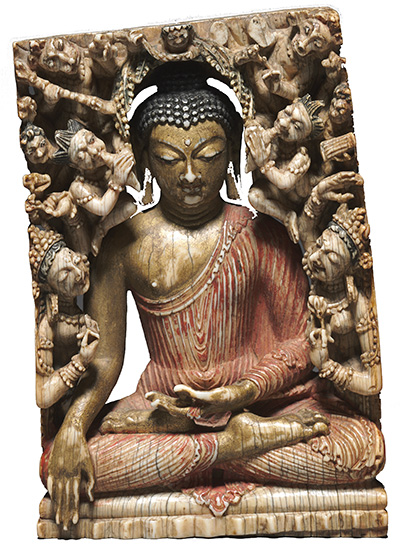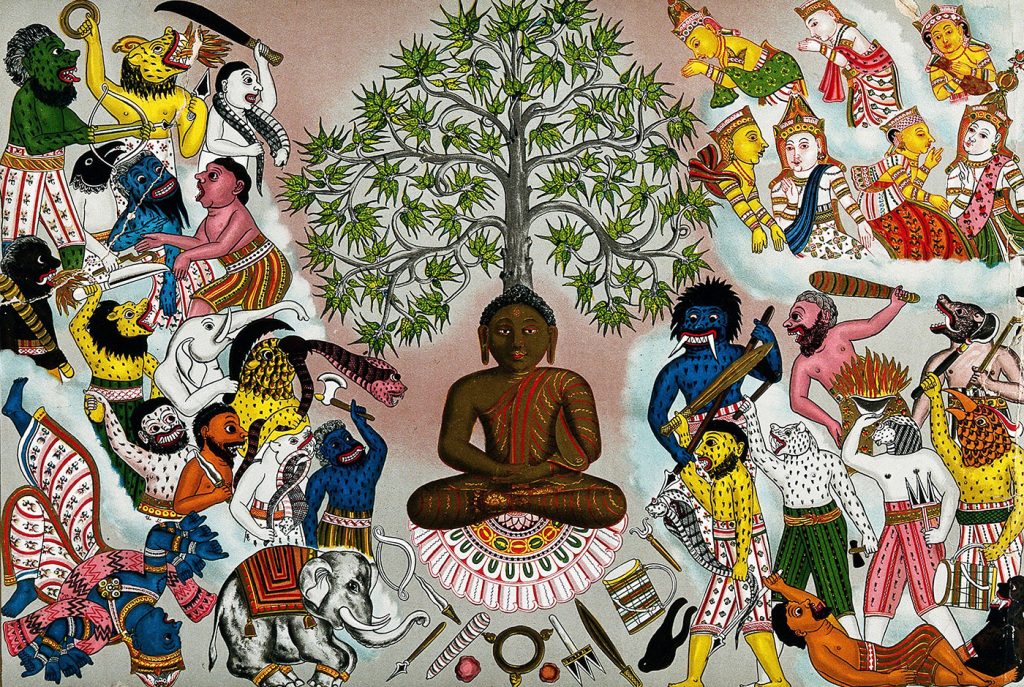In Buddhism, Mara is what we would think of as the devil. But is it so? What is Mara? Who is Mara? Does Mara really exist?
For Buddhists, Mara is often just the psychology of our deluded mind. But when you read the suttas, Mara is more than just psychology. He turns up in various places. He often comes to the Buddha and whispers things in his ear. For example, after the Buddha was fully enlightened and sitting in the bliss of jhana, he was contemplating whether to teach or not. Then Mara went up to him and said, “Don’t bother. These people are difficult to teach.
They won’t get what you say. It will be much easier for you just to enjoy your peace.” If Mara were just defilements in the mind, that wouldn’t have turned up in a Buddha’s mind. Someone who has been practicing for eons would not have this thought.
So it seems that Mara is more than just a personification of evil. Based on the suttas, Mara is a real person. He lives somewhere. And he doesn’t live in some cauldron of oil, ready to pull somebody in. He lives in the Paranirmitavashavartin realm, a heavenly realm. The name translates as “the heaven where beings delight in controlling the creation of others.” In other words, they manipulate. They delight in controlling other people’s stuff, other people’s delights, other people’s projections, other people’s creations.
There is a sutta on the ten armies of Mara. It’s good to be aware of how the little things we do are feeding into this trap that Mara perpetuates. This trap keeps you ticking over in samsara and telling you that if you try hard enough, get the right house, get the right car, and find the right partner, you will live happily ever after! We all buy into it, right? It is only when you are out of the sense world and in the jhanas that you have escaped Mara. But in the meantime, we can be aware of Mara’s realm so that we can recognize and turn away from the very things that cause us to perpetuate suffering. These are ten armies of Mara:
The first army is sensual pleasures. It’s like our bread and butter. The economy thrives on it. We buy the latest iPhone, thinking that it’s going to be exactly what we need. We go out to dinner. We spend ages finding the right food. Have sensual pleasures ever given you everlasting happiness? No. But you keep pursuing them, because somewhere deep inside you think that you’re going to find that sweet chili.
The next time you’re going on the internet to find the perfect thing for the corner of your room, just hold back. Is that thing going to bring ultimate happiness? Is it better to buy that thing, or just sit down and do something more meaningful with your time? The internet is like heaven for Mara. He doesn’t even have to bother. He probably created the internet. Maybe he did. . . . Anyway, I won’t go down that road.
The second army is boredom. We are encouraged to not waste a moment by sitting down and doing nothing. We go on our phones to see if something needs to be done or if someone has replied to us. We can’t just sit, read the newspaper, and finish our work. We can’t “do nothing.” I was on the train going to Sydney the other day, and I noticed this glassy look in people’s eyes when they weren’t on their phones. We have difficulty with just doing nothing. We stare into outer space, and we look dead.
We are afraid to get out of the box that we have put ourselves into. And Mara loves it.
Allow yourself to be bored. Allow yourself to not pick up your phone. Allow yourself to not go to the fridge and find something to put in your mouth just to entertain yourself. In other words, boredom and discontent take us away from being silent and looking inside our bodies and minds.
The third army is something, fortunately, that most of us don’t have to deal with: hunger and thirst. I am sure few of us have had to genuinely experience hunger, but if we did, we’d kill somebody. Do you know how many wars are fought over water or land that is fertile, just because of hunger and thirst? On the other side of it, obesity is also an obsession with hunger and the desire to feed our bodies. So this one is still relevant, even in our modern times.
The fourth army is craving. This may seem like a repeat, since sensual pleasures are all about craving. But craving is not just for sense pleasures. It’s also our craving to be somebody. We want to be known at work. We want to be the person who does a good job. We are constantly trying to be the one that people like, the one that people go to. It’s all good stuff, but it’s still rooted in desire. We feed on that drive.
There’s the desire not to be as well. This is a bit anarchistic. It says, “Oh, who cares? I’m just going to do whatever I want.” The desire for annihilation is the precursor to not keeping your precepts.

The fifth army is dullness and drowsiness. We work like crazy and we sleep like crazy. We have no time to meditate because we’re so busy doing one or the other. Notice how we tend to push ourselves to the max and then collapse. We have no time to just be mindful, clear, and aware. Dullness and drowsiness could also be dulling our senses with alcohol, or simply falling asleep in front of the television. Notice your tendency to switch off, rather than being with your mind and being with the uncomfortable feeling of wanting to fall asleep. Notice it, but don’t buy into it.
The sixth army is cowardice. It is not taking a risk, not going outside your comfort zone, not leaving the job you hate. It’s the voice of your mother saying, “Don’t do it! Why are you wasting your time going to monasteries? Just do what everybody else does!” Cowardice often stops us from getting out of the comfort zones that we put our minds in. We do the same old thing, go to the same old places on holiday, and talk to the same old people about the same old stuff, because we are afraid. We are afraid to get out of the box that we have put ourselves into. And Mara loves it. He doesn’t want you to look outside.
The seventh army is doubt. Nowadays, we have 10 million religions to choose from. Each of them says “This is the path to enlightenment!” Some say you can have your cake and eat it too. We have so many teachings to choose from. How do we know which one is the right one?
The eighth army is contempt and obstinacy. Contempt is putting someone down. We enjoy that, don’t we? We feel superior when we think, “They don’t really know what they’re doing, but I know what I’m doing.” We delight in that, and it stops us from looking within and seeing our own faults. Quite often, what we don’t like about others are the very things that we don’t like about ourselves. Contempt is another one that Mara loves. And obstinacy is simply being stubborn. “I know what I’m doing. You don’t tell me what to do. I’m going to keep doing it my way.”
It’s good to be aware of how the little things we do are feeding into this trap that Mara perpetuates.
The ninth army is praise and honor. We like doing a good job. We’re suckers for people liking us. We’re suckers for people. This isn’t a bad thing on its own, but it drives us in a certain direction. It drives us to do what people want us to do. It drives us to do what Mara wants us to do. It drives us to not do something that is different from what the sheep are doing.
The last army is extolling oneself and scorning others, or putting ourselves up and disparaging others. Again, we do this all the time. We do it in innocuous ways, like criticizing the government. We think that’s all right because the government doesn’t talk back. The TV doesn’t talk back to us either. But think: What does it do to our mind when we belittle someone? What does it do to our hearts when we think of ourselves as slightly superior to someone else?
These are the ten armies of Mara. I hope I didn’t depress anyone. It’s good to be aware of them, because they’re not inherently evil but, rather, subtle ways that we waste our life. Becoming aware of these tendencies helps us to pull back every time we are about to bite the hook. And, of course, we can then turn our attention to the far more beautiful things that we can do with our minds, like having thoughts of generosity, caring, sharing, and compassion. These things are what the Buddha encouraged us to develop to find true joy that leads to a purified mind.
♦
Adapted from the dharma talk “Venerable Upekkhā: Ten Armies of Mara,” based on Letter from Mara by Ajahn Punnadhammo, uploaded to the Anukampa Bhikkhuni Project YouTube channel.
Thank you for subscribing to Tricycle! As a nonprofit, we depend on readers like you to keep Buddhist teachings and practices widely available.
